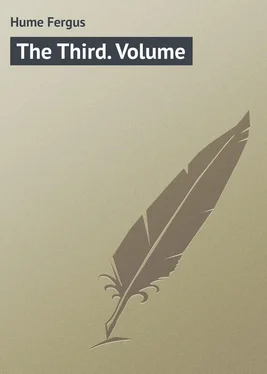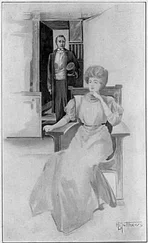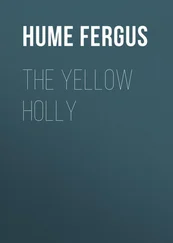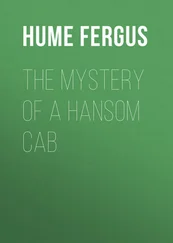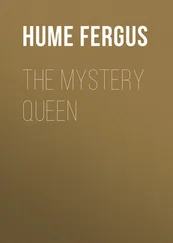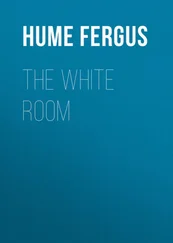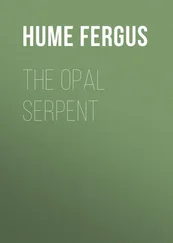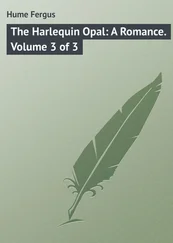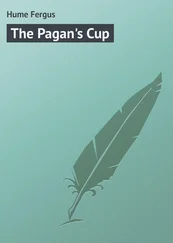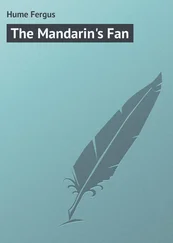Fergus Hume - The Third. Volume
Здесь есть возможность читать онлайн «Fergus Hume - The Third. Volume» — ознакомительный отрывок электронной книги совершенно бесплатно, а после прочтения отрывка купить полную версию. В некоторых случаях можно слушать аудио, скачать через торрент в формате fb2 и присутствует краткое содержание. Жанр: foreign_prose, на английском языке. Описание произведения, (предисловие) а так же отзывы посетителей доступны на портале библиотеки ЛибКат.
- Название:The Third. Volume
- Автор:
- Жанр:
- Год:неизвестен
- ISBN:нет данных
- Рейтинг книги:3 / 5. Голосов: 1
-
Избранное:Добавить в избранное
- Отзывы:
-
Ваша оценка:
- 60
- 1
- 2
- 3
- 4
- 5
The Third. Volume: краткое содержание, описание и аннотация
Предлагаем к чтению аннотацию, описание, краткое содержание или предисловие (зависит от того, что написал сам автор книги «The Third. Volume»). Если вы не нашли необходимую информацию о книге — напишите в комментариях, мы постараемся отыскать её.
The Third. Volume — читать онлайн ознакомительный отрывок
Ниже представлен текст книги, разбитый по страницам. Система сохранения места последней прочитанной страницы, позволяет с удобством читать онлайн бесплатно книгу «The Third. Volume», без необходимости каждый раз заново искать на чём Вы остановились. Поставьте закладку, и сможете в любой момент перейти на страницу, на которой закончили чтение.
Интервал:
Закладка:
"Breakfast!" cried Claude, clutching his hair; "I could not eat a morsel. Have you no feelings, you little monster, to propose breakfast to me, after hearing such hideous news. Why don't you give me sympathy, and try and help me, instead of sitting at your confounded rasher of bacon like a graven image."
"I'll do all in my power later on," said Tait quietly; "but you are upset by this news, and no wonder. Try and eat a little, then you can tell me all about it, and I'll give you the best advice in my power."
Thus adjured, Claude drew in his chair, and managed to eat a morsel of toast and drink a cup of coffee, after which he lighted his pipe, and smoked furiously, while Tait, anxious that his friend should regain his self-control, made a lengthened meal, and talked of divers matters. Breakfast over, he also filled his favorite pipe, and, drawing a chair close to that of Larcher's, waited for an explanation.
"Well, Claude," said he, after a pause, during which the other showed no disposition to speak, "tell me your trouble."
"I have told you," grumbled Larcher angrily; "if you want to know any more about it, read those papers."
"It would take too long, and, as it happens, I am already tired with reading. Tell me about the affair as shortly as possible, and then we can go through the papers together. You say your father was murdered. Who committed the crime?"
"No one knows! The criminal is still at large."
"After five-and-twenty years he is likely to remain so."
"No!", cried Larcher vehemently, striking the table; "I'll hunt him down, and find him out, and put a rope round his neck, so help me God!"
"You say your mother was accused of the crime," said Tait, ignoring this outburst.
"Yes. But she was acquitted on the evidence of my father's valet. Shortly afterward she died in London. I don't wonder at it," said poor Claude distractedly; "the shame, the disgrace! If she survived she was bitterly punished. I should like to see the man who would dare to asperse her memory."
"No one will do so," said Tait soothingly. "Control yourself, my dear fellow, and we will look into this matter together. I have just been reading about a crime, but I did not think I would be so soon concerned in dealing with one."
"You will help me, Tait? You will stand by me?"
"My dear friend, can you ask? I am completely at your service, and together we will do all in our power to discover the murderer of your father and clear the memory of your mother."
"It is clear. She was acquitted by the jury. Don't you dare to – "
"I don't dare to say anything," interrupted Tait impatiently. "Do be reasonable, my good fellow. So long as I am ignorant, I can say nothing. Tell me the particulars and we may arrive at some conclusion. Now then, give me a précis of the case."
Dominated by the superior calm of his friend, Claude related the Larcher affair as succinctly as possible. The details of the case had impressed themselves too strongly on his brain for him to hesitate in the narration, and, keeping his emotions well in hand, he managed to give a fairly minute account of the tragedy which had taken place at Horriston in the year 1866.
The effect on Tait was surprising. A look of blank astonishment overspread his face as Larcher proceeded with his story, and when it was finished he looked anxiously at his friend. Apart from the details of the case, he was deeply interested in the matter from another point of view. Larcher waited to hear what his friend thought of the case, but instead of commenting thereon Tait both acted and spoke in an apparently irrelevant manner.
Without a word he heard Claude to the end, then rose from his seat, and walking to the other end of the room returned with three volumes bound in red cloth.
"This book is called 'A Whim of Fate,'" said he placing the volumes at Larcher's elbow. "Have you read it?"
"Confound it, what do you mean?" burst out Claude, with justifiable wrath. "I tell you of a serious matter which nearly concerns myself, and you prattle about the last fashionable novel."
"Wait a minute," said Tait, laying a detaining hand on his friend's coat sleeve. "There is more method in my madness than you give me credit for."
"What do you mean?"
"The story you tell me is most extraordinary. But the information I am about to impart to you is more extraordinary still. You say this crime at Horriston was committed five-and-twenty years ago."
"Yes, you can see by the date of those newspapers."
"It has very likely faded out of all memories."
"Of course! I don't suppose anyone is now alive who gives it a thought."
"Well," said Tait, "it is certainly curious."
"What is curious? Explain yourself."
"The story you tell me now was known to me last night."
Larcher looked at his friend in unconcealed surprise, and promptly contradicted what seemed to be a foolish assertion.
"That is impossible, Tait. I heard it only last night myself."
"Nevertheless, I read it last night."
"Read it last night!" repeated Larcher skeptically.
"In this book," said Tait, laying his hand on the novel.
"What do you mean?" demanded the other impatiently.
"I mean that John Parver, the author of this book, has utilized the events which took place at Horriston in 1866 for the purpose of writing a work of fiction. The story you tell me is told in these pages, and your family tragedy is the talk of literary London."
CHAPTER VI
TRUTH IS STRANGER THAN FICTION
This astonishing statement was received by Claude with a disbelieving smile; and so convinced was he of its untruth that he affected anger at what he really believed to be the flippancy of Tait's conduct.
"It is no doubt very amusing for you to ridicule my story," said he, with cold dignity, "but it is hardly the act of a friend. Some matters are too serious to form the subject of a jest; and this – "
"I am not jesting," interrupted Tait eagerly. "I assure you that the tragedy which concerned your parents forms the subject-matter of this novel. You can read the book yourself, and so be convinced that I am speaking the truth. The names and places are no doubt fictional, but the whole story is narrated plainly enough."
Larcher turned over the three volumes with a puzzled expression. That a story with which he had only become acquainted within the last twenty-four hours should be printed in a book, and that the book itself should be brought so speedily under his notice, seemed to him quite inexplicable. The strangeness of the occurrence paralyzed his will, and, contrary to his usual self-dependence, he looked to Tait for guidance.
"What do you think of it?" he asked irresolutely.
"Ah! That requires some consideration, my friend. But before we go into the matter let us understand our position toward each other. You believe this story of your father's death?"
"Certainly. Mr. Hilliston would not tell me an untruth, and moreover this bundle of extracts from provincial newspapers confirms his statement. I truly believe that my father, George Larcher, was murdered at Horriston in 1866 by – and there you have me – I know not by whom. My own opinion is that Jeringham is – "
"One moment, Claude! Let us settle all preliminaries. Are you resolved to take up this matter!"
"I am! I must clear the memory of my mother, and avenge the death of my father."
"Would it not be better to let sleeping dogs lie?" suggested Tait, with some hesitation.
"I do not think so," replied Claude quietly. "I am not a sentimental man, as you know; and my nature is of too practical a kind to busy itself with weaving ropes of sand. Yet in this instance I feel that it is my duty to hunt down and punish the coward who killed my father. When I find him, and punish him, this ghost of '66 will be laid aside; otherwise, it will continue to haunt and torture me all my life."
Читать дальшеИнтервал:
Закладка:
Похожие книги на «The Third. Volume»
Представляем Вашему вниманию похожие книги на «The Third. Volume» списком для выбора. Мы отобрали схожую по названию и смыслу литературу в надежде предоставить читателям больше вариантов отыскать новые, интересные, ещё непрочитанные произведения.
Обсуждение, отзывы о книге «The Third. Volume» и просто собственные мнения читателей. Оставьте ваши комментарии, напишите, что Вы думаете о произведении, его смысле или главных героях. Укажите что конкретно понравилось, а что нет, и почему Вы так считаете.
